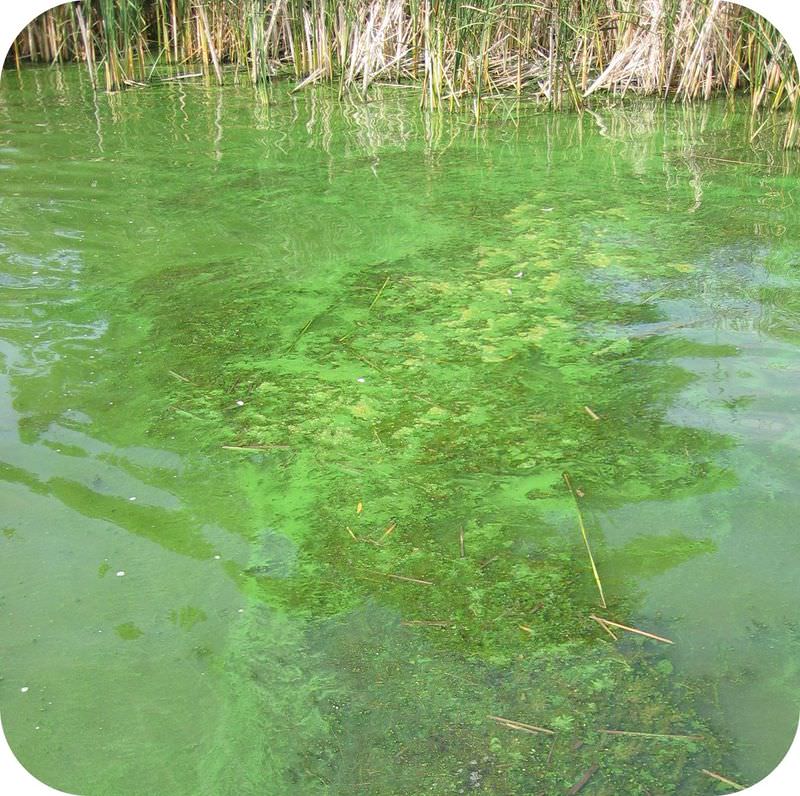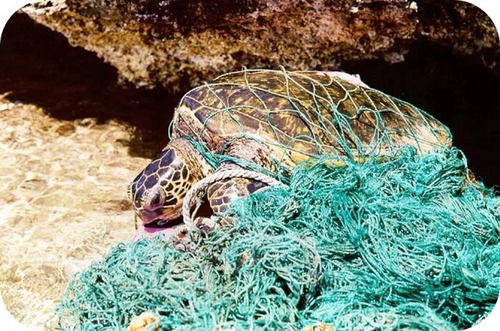12.28 Effects of Water Pollution
12.28 Effects of Water Pollution
Can water have too many nutrients?
Excess nutrients can cause algae to grow like crazy. Too much algae causes the green slime on the water that you see in this picture. These excess nutrients come from fertilizers that were carried by the runoff from farmland. This type of water pollution can have serious consequences for the other forms of life trying to survive here.
Effects of Water Pollution
Water pollutants can have an effect on both the ecology of ecosystems and on humans. As a result of water pollution, humans may not be able to use a waterway for recreation and fishing. Drinking water can also be affected if a toxin enters the groundwater.
Eutrophication
In a marine ecosystem, algae are the producers. Through photosynthesis, they provide glucose for the ecosystem. So, can too much algae be a bad thing? Eutrophication is an over-enrichment of chemical nutrients in a body of water. Usually these nutrients are the nitrogen and phosphorus found in fertilizers. Run-off from lawns or farms can wash fertilizers into rivers or coastal waters.
Plants are not the only things that grow more quickly with added fertilizers. Algae like the excess nutrients in fertilizers too. When there are high levels of nutrients in the water, algae populations will grow large very quickly. This leads to overgrowths of algae called algal blooms. However, these algae do not live very long. They die and begin to decompose. This process uses oxygen, removing the oxygen from the water. Without oxygen, fish and shellfish cannot live, and this results in the death of these organisms (Figure below).
Certain types of algal blooms can also create toxins. These toxins can enter shellfish. If humans eat these shellfish, then they can get very sick. These toxins cause neurological problems in humans.
Lake Valencia, Venezuela, showing green algal blooms. How did the algal bloom form? What will it do to the lake over time?
Ocean Acidification
Ocean acidification occurs when excess carbon dioxide in the atmosphere causes the oceans to become acidic. Burning fossil fuels has led to an increase in carbon dioxide in the atmosphere. This carbon dioxide is then absorbed by the oceans, which lowers the pH of the water. Ocean acidification can kill corals and shellfish. It may also cause marine organisms to reproduce less, which could harm other organisms in the food chain. As a result, there also may be fewer marine organisms for humans to consume.
Aquatic Debris
Aquatic debris is trash that gets into fresh- and saltwater waterways. It comes from shipping accidents, landfill erosion, or the direct dumping of trash. Debris can be very dangerous to aquatic wildlife. Some animals may swallow plastic bags, mistaking them for food. Other animals can be strangled by floating trash like plastic six-pack rings. Wildlife can easily get tangled in nets (Figure below).
Marine trash can harm different types of aquatic life. Pictured here is a marine turtle entangled in a net. How can you keep this from happening?
Waterborne Diseases
Unsafe water supplies have drastic effects on human health. Waterborne diseases are diseases due to microscopic pathogens in fresh water. These diseases can be caused by protozoa, viruses, bacteria, and intestinal parasites. In many parts of the world there are no water treatment plants. If sewage or animal manure gets into a river, then people downstream will get sick when they drink the water. According to the World Health Organization (WHO), diarrheal disease is responsible for the deaths of 1.8 million people every year. It was estimated that 88% of the cases of diarrheal disease are caused by unsafe water supplies.
Summary
- High levels of nutrients, called eutrophication, can cause conditions that deprive fish of oxygen.
- Ocean acidification occurs when excess carbon dioxide in the atmosphere causes the oceans to become acidic, which harms corals and shellfish.
- Debris can be dangerous to aquatic wildlife.
Explore More
Use the resource below to answer the questions that follow.
- Water Pollution and the Public Health Risk Engulfing Greenville, NC, USA at http://www.youtube.com/watch?v=0PgQi0w1m3s (10:01)
- What are some of the problems causing poor water quality around Greenville, North Carolina?
- Can you gauge the health of a river by just looking at it? Why or why not?
- What pollutants are causing issues in these rivers?
- What can happen to a person who goes swimming in a bacteria-rich stream?
Review
- What is eutrophication?
- Explain what causes eutrophication and how it affects the ecosystem.
- Explain what causes ocean acidification and how it affects the ecosystem.
- What are waterborne diseases? What causes waterborne diseases?
- Log in or register to post comments
- Email this page



